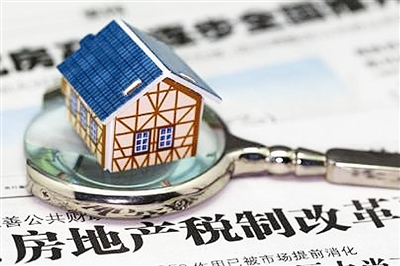Property tax trial set for limited expansion
- By Li Shen
 0 Comment(s)
0 Comment(s) Print
Print E-mail China.org.cn, August 12, 2013
E-mail China.org.cn, August 12, 2013

The long-running issue of property tax in China once again took center stage following a State Administration of Taxation circular on July 16 which underscored a commitment to look into the possibility of expanding property tax pilot programs.
Prior to this, the National Development and Reform Commission issued guidelines on deepening reforms of the economic system, which explicitly recommended the expansion of property tax trials. Some, however, believe that expansion should be limited.
Speaking at a recent lecture in Beijing, Jia Kang, director of Institute of Fiscal Science with the Ministry of Finance told China.org.cn: "The expansion of the property tax trial scheme is clearly the direction in which China's taxation and real estate reform is heading. But it can not be levied on all people."
The Chinese government introduced a property tax pilot program in Shanghai and Chongqing in 2011 in an effort to cool the feverish property market.
The latest statistics show that these efforts have been unsuccessful, as the trend for rising house prices looks set to continue. According to the National Bureau of Statistics, on a year-on-year basis, new home prices rose in almost all cities last month. The only exceptions were Wenzhou and Haikou, which reported falling prices.
Jia Kang said that the property tax will affect housing prices over the long term and will not have an instant effect. Housing prices in China's mega-cities and developed areas have risen continuously over a long period and it would not be beneficial to see a big drop in housing prices during China's period of urbanization. On the contrary, such a huge drop would signal a possible social or economic crisis. . The purpose of imposing a property tax is to stabilize the real estate market and promote its healthy development, avoiding the damaging impact of fluctuating housing prices.
Discussing regulation of the property market, Jia Kang emphasized two areas which in his view need strengthening. One is the construction of housing for low-income families and the "Sandwich Stratum" group, which would solve their housing problems by ensuring the construction of secure, affordable housing. The other is the mechanism construction of the property market, which once it is strengthened would mean that the planning of the commercial housing market and adjustment of income distribution would be enhanced and property allocation would be optimized through taxation on high-end real estate. "Only through such measures will people no longer feel so squeezed by the price of commercial housing," Jia said.
Jia added that the government should take into account the interests of low and middle-income families when weighing up the threshold for property tax.
Jia said that if Beijing introduces the tax, it should be done incrementally, with an owner's first house being tax-exempt, their second house taxed at a low rate and their third house taxed at the standard rate. Such a measure would reduce both the vacancy rate and property speculation while also increasing supply for the rental market. It would also stabilize rental prices and ease fears that renters will be hit by the property tax.






Go to Forum >>0 Comment(s)